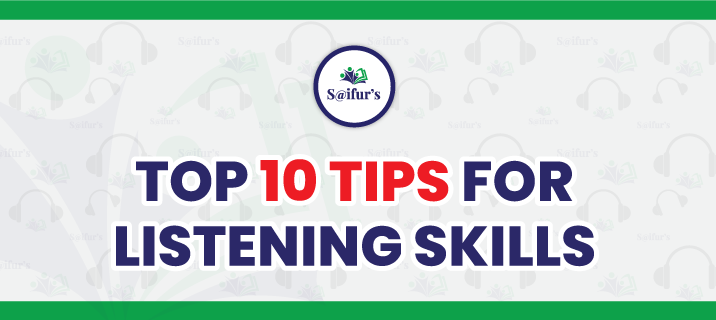

Blog Details

Listening skill building is a vital part of learning any language. You cannot call yourself an expert or proficient in English language if your listening skills are lacking. In every aspect of your life, from academics to job interviews you must display quality listening skills if you want to succeed. However, it can be quite difficult for non-native English speakers to develop this skill.
That’s why we are going to discuss ‘Top 10 Tips for Listening Skills’ in this article so that you can improve your English listening skills.
The first thing that is required to be an effective listener is that you maintain eye contact with the speaker. Imagine someone is talking to you, and you keep looking here and there, scrolling through your phone or looking out of a window. This will make you a bad listener. You will neither be able to hear everything the speaker is saying nor will you understand what the speaker is saying. That’s why the most important rule of developing listening skills is to maintain eye contact with the speaker.
To build up your listening skills you have to pay proper attention to the conversation. Making eye contact with the speaker is the first step of paying attention, but there’s more to paying attention. You have to make sure that you are not only paying attention physically but also mentally.
You should put aside distracting thoughts and worries for the duration of the conversation, and invest your full concentration in the conversation. However, paying attention doesn’t mean that you will have to stand at attention the whole time. Try to be relaxed, as it will help you to understand more clearly.
The problem that non-native English speakers face the most is that they cannot grasp the meaning of the sentences as soon as they hear it. They first have to translate what is being said into their native language. This significantly impedes their English listening skills. To prevent this from happening you should try to visualize what the speaker is saying. Pay attention to what is being said, and try to picture it in your mind. This will give a positive boost to your listening skills.
Sometimes even after paying the utmost attention, and visualizing what the speaker is saying, you still might not understand some parts of the conversation. Don’t be ashamed or get discouraged if that happens. In fact, this is quite natural. Even native English speakers sometimes have these kinds of problems.
When you don’t understand a part of the conversation or you have some confusions, you should ask the speaker clarifying questions. However, you should ask clarifying questions without interrupting. Asking clarifying questions will not only remove your doubts but also show that you’re paying attention.
One of the best ways to show your listening skills is to respond properly when you’re asked a question. Sometimes you will be asked if you understand what is being said and other times you will be asked for your opinions. In both cases respond properly and respectfully to show that you’re listening. This will greatly improve your listening skills.
Nonverbal cues mean the speaker’s body language, posture, and hand gestures etc. In our day to day life most of the conversations happen nonverbally. You can get a good idea of what is being said if you pay close attention to the nonverbal cues and the tone of the speaker’s voice. By noting the enthusiasm, boredom, happiness, or sadness in the speaker’s voice you will be able to visualize what is being said more easily. This will help you to further develop and improve your listening skills.
Another thing that bothers non-native English speakers the most is the different accents. Across the globe, English is spoken with different accents in different countries. For example, USA, UK, Australia, Canada and New Zealand all are English speaking countries but they all speak English in different accents.
To properly develop your English listening skills you should listen to all kinds of accents. After having a general idea of different accents, identify which is the most difficult for you to understand. Concentrate more time on the accent which is giving you the most trouble.
You should try to read and listen to English simultaneously. If you do this, you will be listening to and reading the same words, which will make it easier for you to understand everything. The easiest and best way to do this is to watch an English movie with subtitles on. You can also read a book and listen to the audio version of that book simultaneously.
After learning all the tips and tricks to improve listening skills now it’s time to practice. The best way to practice listening skills is to do it with other people. Find a listening partner, and listen and talk to them. Point out the mistakes you both are making as well as keep track of your own mistakes.
Finally, to improve your listening skills you will have to listen to yourself. Record yourself talking and then listen to the recording or simply pay attention to yourself when you speak. This will also help you to further develop your listening skills. Think of it as self-practice. By listening to yourself you will realize where your weaknesses are, and then you can work to solve those problems.
Practice makes perfect. So you must keep on practising if you want to have perfect listening skills. Follow the tips mentioned in this article, practice every day, and you will be able to successfully improve your listening skills.

Top 10 Tips for Phonetics
By Farjana Nasrin
Top 10 Tips for PhoneticsPhonetics or accurate pronunciation is an important part of learning the English language. Non-native English speakers ar ...
view more
Top 10 Tips for Listening Skills
By Farjana Nasrin
Top 10 Tips for Listening SkillsListening skill building is a vital part of learning any language. You cannot call yourself an expert or proficien ...
view more
Top 100 Verbs You should Know for E ...
By Farjana Nasrin
Top 100 Verbs You Should Know for EnglishVerbs are probably the most important English language words that an English speaker must know. In every ...
view more